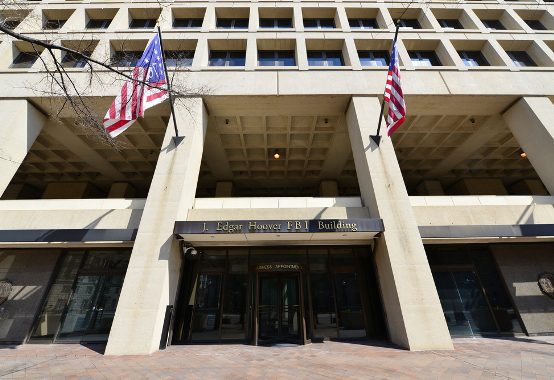Yes, the Deep State Really Does Exist
Far from a conspiracy theory, it's a feature of our federal government, and it targets those who stand in its way.
Boston University law professor, past federal court official, Harvard grad, and former State Department attorney Rebecca Ingber assures us that the deep state swamp is a myth—it does not even really exist.
By using the “Deep State concept,” she says, “the President and his supporters have attacked the career bureaucracy as disloyal.” But “far from an organized cabal of conniving puppeteers, these faceless bureaucrats are just people like you and me,” and “one of them once was me.”
Ingber does concede that “there is a certain degree of organization among the career ranks.” But then she claims, “The vast majority of bureaucratic resistance to a President’s agenda is neither organized nor hostile resistance” but simply a tendency to support the “status quo.”
She concludes, “For career public servants, even under the most smoothly-running Presidential administrations, trying to get anything done in the executive branch is a continuous exercise in banging one’s head against a wall and hoping that one day, many, many months and meetings and non-papers later, you may begin to notice the early stages of a small dent” in that status quo.
So at one level, the fact of a Washington deep state bureaucracy is indisputable. Even Ingber concedes that the swamp is organized and resists change. In fact, establishing “teamwork” within the federal work environment is official government personnel procedure, and success and promotions depend on adhering to those group norms. This is all fine, but a tight-knit culture with sensitive and publicly unavailable expertise is exactly what keeps bureaucracy mostly free from real oversight.
Government employees all point to the civil service principle that grants them protection from political abuse. But they omit that they in turn, according to the Intergovernmental Personnel Act, “are prohibited from using their official authority for the purpose of interfering with or affecting the result of an election or nomination for office.”
Still, here was Bill Dudley, the former president of the Federal Reserve Bank of New York, the Fed’s second highest office, brazenly urging leaders to “consider how their decisions will affect the outcome in 2020,” in an article titled, “The Fed Shouldn’t Enable Donald Trump.”
Lawrence Summers, a former top fiscal official for Presidents Bill Clinton and Barack Obama, responded that it “might be the least responsible statement by a former financial official in decades.” And is one really supposed to assume that Dudley wouldn’t have acted that way while in office?
More well known is what was actually discovered at the equally prestigious FBI when, after public disclosure, its Inspector General found that its top administrators did improperly attempt to affect the 2016 presidential election, a claim supported by former Democratic governor and senator Bob Kerrey, who called for a full investigation. Republican Attorney General William Barr concurred, even characterizing the actions of the FBI as those of a Pretorian Guard.
Even in normal operations, government bureaus often act more as deep states than as public servants. Fifteen hundred IRS and Treasury agents were caught publicly exposing tax returns. Securities and Exchange Commission staff admitted to investigators that their bosses encouraged them to indict the most newsworthy suspects rather than the most clearly guilty even after judicial admonishment.
And it is rare that more than token penalties have been assessed for such improprieties. Only 39 percent of the tax leakers were fired. Congress and political executives hardly even try to get to the facts for fear of retaliation.
Former chairman of the House Committee on Government Oversight and Reform Jason Chaffetz just published a book titled The Deep State, which explains the process by which the bureaucracy operates, after abusive leaks by the Secret Service led to his leaving Congress.
Chaffetz has proposed legal, oversight, transparency, and civil service reforms, all of which are fine but none of which will really pierce Washington’s impenetrable multi-layered bureaucracy, consisting of millions of employees almost impossible to fire. Yet these workers have the power to enact what the Competitive Enterprise Institute’s Clyde Wayne Crews calls “dark matter,” regulations that do not appear in published form but are binding nonetheless.
Yes, there is a deep state. Even a major Brookings Institution report conceded that “the kudzu that clogs government hierarchies” “makes even routine decisions risky.” The problem is that it runs too deep for simple solutions to work.
The original Pretorian Guard proved a disaster for three centuries, and while Claudius might have been some improvement over Caligula, it took a Constantine the Great to disband the Guard. He even moved the capital away to the hinterland, which might not be such a bad idea today.
The only real solution, though, is to send most domestic programs back to the states and localities where the Constitution once entrusted most of our public functions.
Donald Devine is senior scholar at the Fund for American Studies. He is the author of America’s Way Back: Reclaiming Freedom, Tradition, and Constitution and Reagan’s Terrible Swift Sword: Reforming and Controlling the Federal Bureaucracy. He served as President Reagan’s director of the U.S. Office of Personnel Management. He can be followed on Twitter @donalddevineco1.


0 Comments:
Post a Comment
Subscribe to Post Comments [Atom]
<< Home